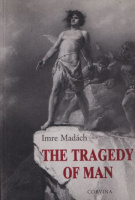kategóriák
- Közlekedés ajánlójegyzék
- Szocreál ajánlójegyzék
- Reklám ajánlójegyzék
- Fotó ajánlójegyzék
- Kínai-japán ajánlójegyzék
- Szentkép ajánlójegyzék
Új árakkal! - Új szentkép ajánlójegyzék II.
- 12 érdekes régiség
 Könyv
Könyv
 Bibliofilia
Bibliofilia
 Régiség
Régiség
 Metszet
Metszet
 Térkép
Térkép
 Fotó
Fotó
 Papírrégiség, Aprónyomtatvány
Papírrégiség, Aprónyomtatvány
 Plakát
Plakát
- Cirkusz
- Modern grafika
- Szocreál
- NER Irodalom
- Egyéb
kosár
üres a kosár
nincs bejelentkezve
Madách Imre : The Tragedy of Man
- leírás
- további adatok
Translated from the Hungarian by George Szirtes.
Introduction by George F. Cushing.
Illustrations by Mihály Zichy.
"The Tragedy of Man is the most controversial work in the long history of Hungarian literature. When it was first published in 1862, it was hailed as a great achievement, but at the same time it-gave rise to a multitude of questions, both literary and philosophical, that have been fiercely debated ever since. It is also one of the most surprising works in Hungarian: it appeared suddenly from the pen of an unknown author and had no obvious antecedents in the Hungarian literary tradition. Moreover, there is nothing, apart from a passing reference(...), to brand it as Hungarian - a unique phenomenon at a time when Madách's contemporaries were agonising over the failure of the revolution of 1848 and its repercussions on national life and expectations. How then did a Hungarian country gentleman who spent most of his short life at home and rarely travelled outside his native country come to write a dramatic poem that takes its place in a broad European tradition represented by such giant figures as Milton, Goethe, Byron and Ibsen?" Illustrations by "The Tragedy of Man is the most controversial work in the long history of Hungarian literature. When it was first published in 1862, it was hailed as a great achievement, but at the same time it-gave rise to a multitude of questions, both literary and philosophical, that have been fiercely debated ever since. It is also one of the most surprising works in Hungarian: it appeared suddenly from the pen of an unknown author and had no obvious antecedents in the Hungarian literary tradition. Moreover, there is nothing, apart from a passing reference(...), to brand it as Hungarian - a unique phenomenon at a time when Madách's contemporaries were agonising over the failure of the revolution of 1848 and its repercussions on national life and expectations. How then did a Hungarian country gentleman who spent most of his short life at home and rarely travelled outside his native country come to write a dramatic poem that takes its place in a broad European tradition represented by such giant figures as Milton, Goethe, Byron and Ibsen?"
Introduction by George F. Cushing.
Illustrations by Mihály Zichy.
"The Tragedy of Man is the most controversial work in the long history of Hungarian literature. When it was first published in 1862, it was hailed as a great achievement, but at the same time it-gave rise to a multitude of questions, both literary and philosophical, that have been fiercely debated ever since. It is also one of the most surprising works in Hungarian: it appeared suddenly from the pen of an unknown author and had no obvious antecedents in the Hungarian literary tradition. Moreover, there is nothing, apart from a passing reference(...), to brand it as Hungarian - a unique phenomenon at a time when Madách's contemporaries were agonising over the failure of the revolution of 1848 and its repercussions on national life and expectations. How then did a Hungarian country gentleman who spent most of his short life at home and rarely travelled outside his native country come to write a dramatic poem that takes its place in a broad European tradition represented by such giant figures as Milton, Goethe, Byron and Ibsen?" Illustrations by "The Tragedy of Man is the most controversial work in the long history of Hungarian literature. When it was first published in 1862, it was hailed as a great achievement, but at the same time it-gave rise to a multitude of questions, both literary and philosophical, that have been fiercely debated ever since. It is also one of the most surprising works in Hungarian: it appeared suddenly from the pen of an unknown author and had no obvious antecedents in the Hungarian literary tradition. Moreover, there is nothing, apart from a passing reference(...), to brand it as Hungarian - a unique phenomenon at a time when Madách's contemporaries were agonising over the failure of the revolution of 1848 and its repercussions on national life and expectations. How then did a Hungarian country gentleman who spent most of his short life at home and rarely travelled outside his native country come to write a dramatic poem that takes its place in a broad European tradition represented by such giant figures as Milton, Goethe, Byron and Ibsen?"
| állapot: |      |
| kategória: | Könyv > Idegennyelvű könyvek > Angol nyelvű > |
| kategória: | Könyv > Szépirodalom > Dráma > |
| kiadó: | Corvina, (1995) |
| cikkszám / ISBN: | 9789631339949 |
| kötés: | fűzve |
| oldalszám: | 269, [2] |
| könyv nyelve: | angol |



























































 Telefon:
Telefon: E-mail:
E-mail:







